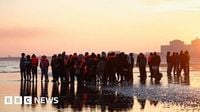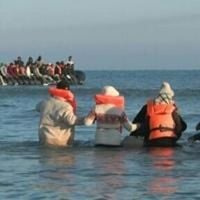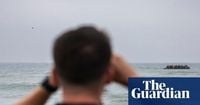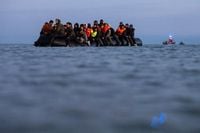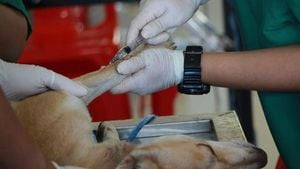In the early hours of September 27, 2025, tragedy struck off the northern coast of France when two women lost their lives attempting to cross the English Channel to the United Kingdom. The incident, which unfolded just south of the beaches of Neufchâtel-Hardelot in the Pas-de-Calais region, has once again thrust the perilous migrant crossings into the spotlight, highlighting both the human cost and the political challenges that surround this ongoing crisis.
According to French officials, the two women were among approximately 100 migrants who set off overnight on a makeshift boat, hoping to reach the UK. The vessel, which launched around 3:15 am, encountered trouble and drifted without engine power, eventually returning to the beach about an hour later. Firefighters, responding to a report of a child suffering from hypothermia, discovered the two women in cardiopulmonary arrest. Despite the efforts of rescue services, the women could not be revived, and a doctor pronounced them dead at 5 am (as reported by BBC and Agence France-Presse).
"We still deplore this fact today: through greed and disregard for human life, smuggling networks are increasingly putting people, adults and children, at risk, selling them crossings across a dangerous sea aboard completely unsuitable vessels," a spokesperson for the préfet of Pas-de-Calais told Agence France-Presse. The spokesperson added, "In the face of this criminal cynicism, the state is demonstrating the strength of its commitment: every day, lives are saved by the determined action of police officers and gendarmes, who tirelessly fight against these departures, and by rescue operations conducted at sea by the maritime prefecture or on land by the firefighters service."
The two women, reported by French newspaper La Voix Du Nord to be Somali, were not the only ones affected. A couple and their child, all suffering from hypothermia, were rushed to a hospital in Boulogne, where they are receiving care. In total, around 60 people were rescued from the boat and are now under the care of civil protection services, according to French official Isabelle Fradin-Thirode.
The incident is being investigated by the Boulogne-sur-Mer public prosecutor, who aims to determine the precise circumstances of the tragedy. Authorities have indicated that Friday night was particularly active for attempted crossings, as smugglers took advantage of improved weather conditions after several days of storms had made the Channel impassable.
The grim toll of Channel crossings continues to mount. French authorities report that at least 25 people have died attempting the crossing in 2025 so far, while the prefecture of Pas-de-Calais puts the number at 17 for deaths specifically from that region's coast. Last year, according to the French coastguard, 50 people died making the attempt, and the International Organisation for Migration (IOM) has documented additional fatalities linked to Channel crossings in both 2024 and this year.
Separately, on the same morning, the body of another migrant was found in a canal leading to the sea in Gravelines, highlighting the persistent dangers faced by those seeking a new life in Britain. The BBC reported that on September 26, hundreds of migrants were seen preparing to cross from the Gravelines area as soon as the weather improved.
The scale of the crossings has reached unprecedented levels. More than 30,000 people have reached the UK in small boats so far in 2025, with over 50,000 making the journey since the Labour government took office in July 2024, according to official data cited by Reuters and BBC. The number of arrivals is at a record high since the UK began reporting such figures in 2018.
This surge has placed increasing pressure on both the UK and French governments to address the crisis. In an effort to deter dangerous crossings and disrupt the business of people-smuggling networks, the two countries recently agreed to a new "one in, one out" returns deal. Under this arrangement, for each migrant the UK returns to France after arriving illegally, France will send a vetted asylum seeker with a strong case for resettlement in Britain. The UK Home Office described the arrival of the first family under this scheme as part of "critical first steps" in the program, and confirmed that four people who arrived by boat were recently flown back to France.
British Prime Minister Keir Starmer has called the crossings "totally unacceptable," while Home Secretary Shabana Mahmood has condemned the "vile" people-smugglers who are "wreaking havoc on our borders." In a further move to tackle illegal immigration, Starmer announced plans for a digital ID card system—dubbed the "Brit card"—that would require every adult in Britain to verify their right to live and work in the country. The card, accessible via smartphone, would be used for job applications and housing rentals, and checked against a central database. The policy is aimed at reducing the incentive for migrants to enter the UK illegally by making it harder to work or rent property without legal status. However, the proposal has faced strong opposition from civil liberty and privacy groups, who argue that it infringes on personal freedoms.
French President Emmanuel Macron has repeatedly argued that the absence of a national ID card system in the UK acts as a pull factor for migrants, making Britain an attractive destination for those seeking to evade detection. French police and gendarmes continue to intercept multiple crossing attempts each week, but officials acknowledge that the lure of safety and opportunity in the UK remains powerful for many.
The broader context of the crisis is shaped by the relentless activity of smuggling networks, which profit from the desperation of migrants by sending them across one of the world's busiest and most dangerous shipping lanes in overcrowded, unseaworthy boats. As the préfet of Pas-de-Calais noted, "smuggling networks are increasingly putting people, adults and children, at risk, selling them crossings across a dangerous sea aboard completely unsuitable vessels."
For those who survive the journey, the challenges do not end upon arrival. Under the new Franco-British scheme, migrants deemed ineligible for asylum—such as those who have traveled through a "safe country"—can be returned to France. Meanwhile, the French state faces its own challenges in providing humanitarian support and policing the coastline.
As the investigation into the September 27 tragedy continues, the incident serves as a stark reminder of the risks faced by migrants and the ongoing struggle for solutions that balance compassion, security, and the rule of law. The loss of two more lives in the Channel underscores the urgent need for coordinated international action to address the root causes of migration and to dismantle the criminal networks that exploit the vulnerable.
With the Channel crossing crisis showing no signs of abating, the debate over how best to respond—both in terms of border security and humanitarian responsibility—remains as contentious and complex as ever.
